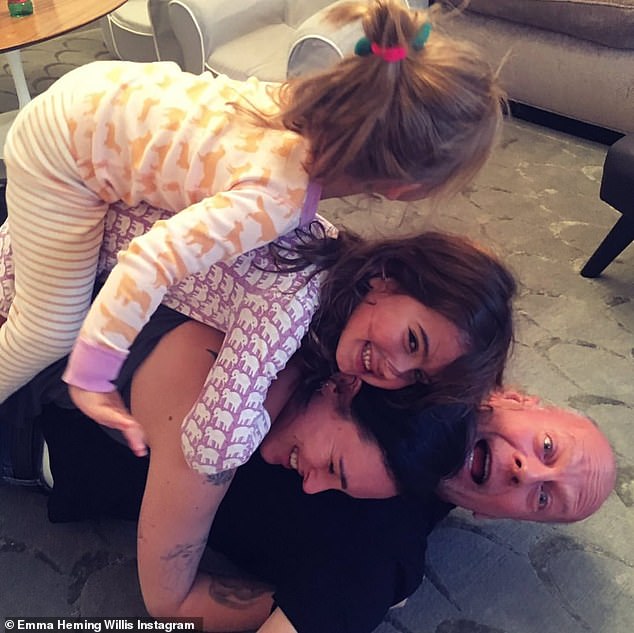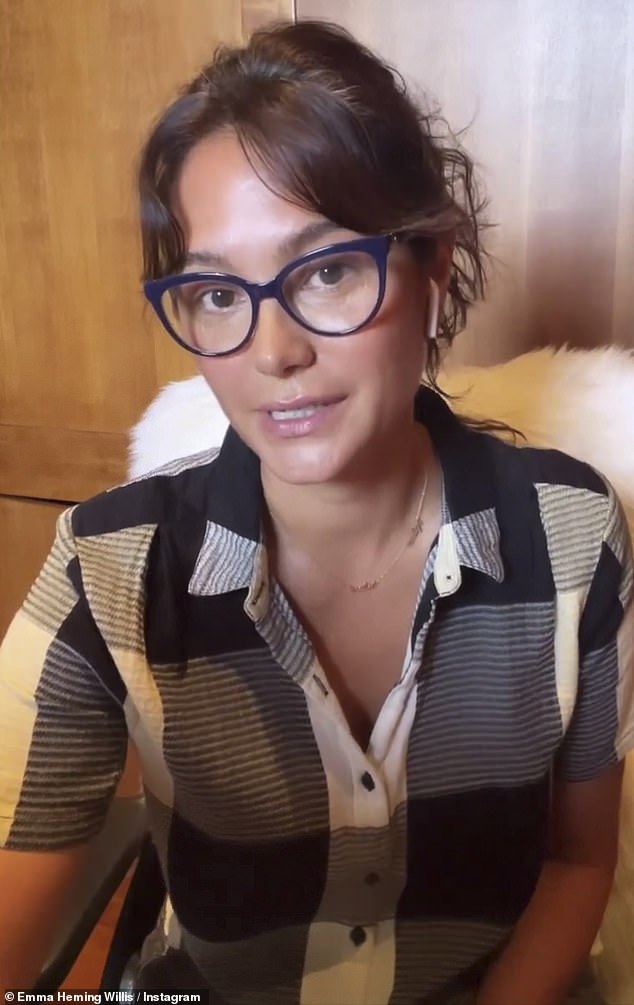Bruce Willis‘ wife, Emma Heming, is standing firm against criticism of her decision to move the actor out of their family home as he battles frontotemporal dementia.
While appearing on Tuesday’s episode of Good Morning America, the actress, 47, acknowledged the judgment she has faced online but stressed the move was made in the best interest of her husband and their daughters, Mabel, 13, and Evelyn, 11.
‘[It] was the safest and best decision — not just for Bruce, but also for our two young girls,’ she told Michael Strahan. ‘And, you know, it’s really not up for a debate.’
Heming explained that having Willis live in a second home with a full-time care team ensures his needs are met around the clock, while also protecting their daughters’ wellbeing.
‘Now I know that Bruce has the best care 100% of the time. His needs are met 100% of the time, as well as our two young daughters. So I’m not gonna take a vote on that.’
The Die Hard star, 70, was diagnosed in 2023 with frontotemporal dementia, a condition that affects language and personality, and causes gradual cognitive decline.

Bruce Willis’ wife, Emma Heming, hit back at criticism over her decision to move him out of their family home amid his devastating dementia battle
While promoting her new book, The Unexpected Journey, Heming reflected on how caregivers are often unfairly judged.
‘Caregivers are so judged, and it just goes to show that people sometimes just have an opinion versus really having the experience,’ she said.
The author continued: ‘I’ll say that dementia plays out differently in every household. If you’ve seen one case of dementia, it’s one case of dementia. So you have to do what is right for your family and what is going to keep your loved one safe, as well as your young children.’
She revealed her ‘wake-up call’ came after a neurologist shared that caregivers often die before their loved ones. ‘I’m not a failure because I need help. It’s okay for me to raise my hand. I didn’t realize that,’ she admitted. ‘I really needed permission for someone to tell me that it’s okay to get help.’
‘That’s what I hope this book does for caregivers: it gives them permission to care for themselves. Because if they don’t, how will they be able to show up and continue to care for the person that they love?’ she added.
Last month, in the ABC special Emma and Bruce Willis: The Unexpected Journey, Heming shared that Willis had been moved into a one-story home better suited to his needs. ‘Bruce would want that for our daughters. He would want them to be in a home that was more tailored to their needs, not his needs,’ she told Diane Sawyer.
Willis’ daughters frequently visit their father for breakfast and dinner, and Heming said their family continues to find ways to spend meaningful time together.

The actress, 47, acknowledged the judgment she has faced online but stressed the move was made in the best interest of her husband and their daughters, Mabel, 13, and Evelyn, 11
!['[It] was the safest and best decision ¿ not just for Bruce, but also for our two young girls,' she told Michael Strahan. 'And, you know, it's really not up for a debate'](https://www.americanpolibeat.com/wp-content/uploads/2025/09/1757439616_366_Bruce-Willis-wife-DEFENDS-decision-to-move-dementia-stricken-actor-out.jpg)
‘[It] was the safest and best decision — not just for Bruce, but also for our two young girls,’ she told Michael Strahan. ‘And, you know, it’s really not up for a debate’
She added: ‘When we go over, either we’re outside, or we’re watching a movie… it’s just really about being able to be there, and connect with Bruce.
‘It is a house that is filled with love, and warmth, and care, and laughter. And it’s been beautiful to see that, to see how many of Bruce’s friends continue to show up for him, and they bring in life, and fun.’
Elsewhere in the interview, Sawyer asked Heming Willis what she would ask her husband today if she could, with the former model responding: ‘how he’s doing, [if] he’s okay, he feels okay. If there’s anything that we could do to support him better.
‘I would really love to know that. If he’s scared. If he’s ever worried. I just would love to be able to just to have a conversation with him.’
Willis shares his adult daughters, Rumer, 37, Scout, 34, and Tallulah, 31, with ex-wife Demi Moore, 62.
When a brain scan confirmed the FTD diagnosis, Heming Willis said she was ‘so panicked’ hearing the diagnosis she ‘couldn’t pronounce’ for the first time.
‘I remember hearing it and just not hearing anything else. It was like I was freefalling.’
When asked if she thought the Pulp Fiction star understood what was happening, Heming Willis said ‘I don’t think Bruce connected the dots’.

Heming explained that having Willis live in a second home with a full-time care team ensures his needs are met around the clock, while also protecting their daughters’ wellbeing
Heming Willis has transitioned into a full-time caretaker for her husband and has written a book about her experience.
The Unexpected Journey hit shelves on September 9.
Of her husband’s current condition, she said: ‘Bruce is still very mobile. Bruce is in really great health overall, you know. It’s just his brain that is failing him.’
As The Sixth Sense star loses his ability to speak, Emma said the family has ‘learned to adapt.
‘We have a way of communicating with him that is just a different, a different way, but I’m grateful. I’m grateful that my husband is still very much here.’

‘Now I know that Bruce has the best care 100% of the time. His needs are met 100% of the time, as well as our two young daughters. So I’m not gonna take a vote on that’
She also revealed the subtle yet ‘alarming’ first signs he was battling dementia.
She said: ‘For someone who is really talkative, very engaged, he was just a little more quiet, and when the family would get together he would kind of just melt a little bit.’
He soon began losing words, and a stutter he dealt with as a child returned.
FTD eats away at the parts of the brain that control language, behavior and personality. Unlike Alzheimer’s disease, the most common form of dementia, patients don’t lose their memory immediately but instead undergo personality changes.
FTD accounts for about one in 20 dementia cases, adding up to roughly 50,000 to 60,000 Americans, compared to over six million with Alzheimer’s.












